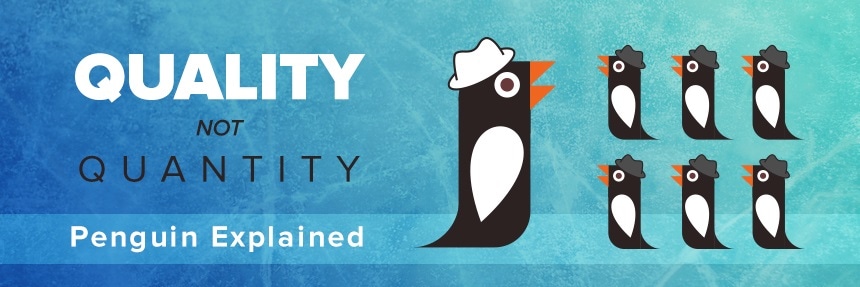
Penguin remains one of Google’s biggest initiatives of all time.
There is a lot of chatter about Penguin 4.0, what it means for Marketers and when it will be rolled out. The Big G as always is not giving much away and it would seem from almost a year of anticipation that this will be an ongoing, continuous update, see how you can prepare and take action below.
We recently introduced Panda, Penguin, and Hummingbird—Google’s “animal crew” of algorithm updates that have transformed the face of search.
This article focuses specifically on the story of Penguin: A feathered friend that first appeared April 2012. Penguin was a hotly anticipated update that helped combat one of the top problems on Google: Sites reaching high search positions with “spammy” backlinks.
A Quick Refresher: The History of Backlinks
When Google was first under development, it needed a new way to figure out which websites should rank highest for given search terms.
It seems obvious in hindsight, but the idea founders Sergey Brin and Lawrence Page had was revolutionary: Each link to a site was an editorial vote vouching for its quality.
In search, these are called “backlinks.” Back then, they were as good as money in the bank.
This was fine in the 1990s: Just a handful of people had the time, technology, or inclination to start a site. As technology grew, the idea that every site’s vote was as valuable as every other ran into trouble: Cheaters could generate thousands of sites.
This quickly gave rise to a whole industry where Blackhat SEO tactics were used to focus on ticking the boxes for the search engines as opposed to providing value to the human user.
A whole industry of SEO was built on exploiting Blackhat SEO Tactics. In 2012, that was all about to change...
By 2012, Google had the tools to train its algorithm to distinguish between “high quality” and “low quality” backlinks.
The army of penguins was unleashed!
Good Backlinks lift you up—Bad Backlinks weigh you down
Getting other sites to link to you is still very important: A 2015 study from top search experts still showed backlinks among the top factors in improving your brand’s visibility in search.
What Penguin changes is what businesses—especially scientific enterprises that aspire to thought leadership—should focus on when building their “backlink portfolio.”
A handful of good backlinks can be more powerful than hundreds or even thousands of poorer ones.
Luckily, Penguin provides clear guidance on what makes a link good.
Good backlinks usually...
- Link to valuable, user-focused content instead of your home page.
- Come from sites that operate within the same industry or niche you do.
- Are associated with high-quality sites that have been around a long time.
- Are endorsed by real experts, such as academics and government officials.
Bad backlinks usually...
- Link to your home page or a page that serves to sell a single product.
- Come from a site with a “generalist” orientation that will link to anything.
- Are associated with low-quality sites that have been online a year or less.
- Have low authorial credibility or are based in regions far from your market.
When all is said and done, getting along with Penguin is simple: Businesses should seek links from websites, brands, and institutions they want to be associated with. The more trusted and credible a site is, the more valuable its “vote” will be.
Keep it Quality: With Penguin, Bad Backlinks Aren’t the End
Even if you have some bad backlinks, don't worry Mitigating their impact is easy. Matt Cutts, one of Google’s top search engineers, has made it clear there are some helpful steps any webmaster can take:
- Identify low-quality sites in your backlink portfolio.
- Contact those sites with a request to remove links.
- If that fails, use Google’s “Disavow Links” tool.
Most of Google’s big changes in recent years have been focused on one thing: Quality. Just as Panda provides guidelines for quality Web content, Penguin does the same with your links.
Stay focused on finding ways to make your site helpful, timely, relevant, user-centered, and easy to use—and hold the same priorities in your backlink strategy—and your scientific brand can be a Google success.
If you have any questions or would like to find out more about best practice, contact us to arrange a chat.